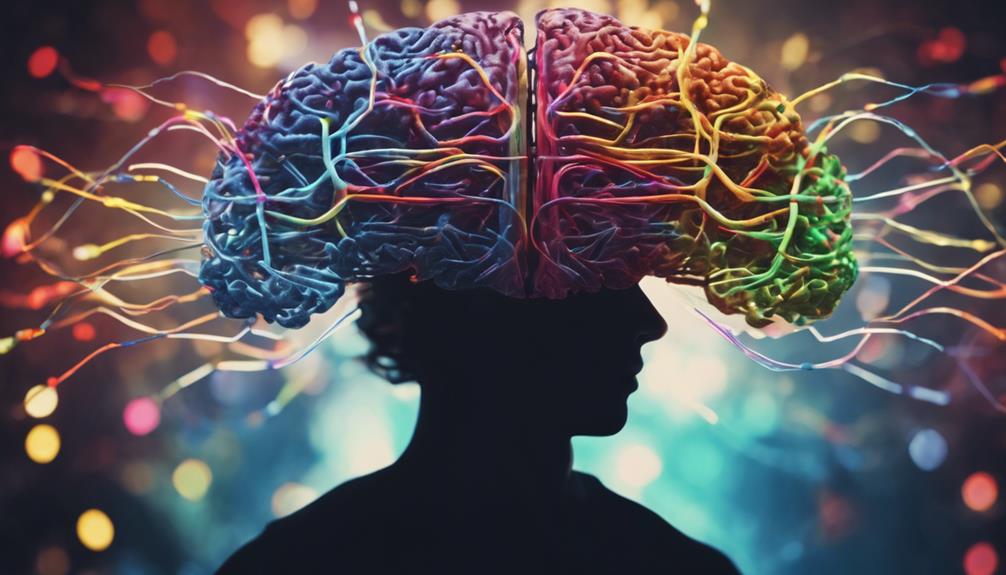When someone randomly crosses your mind, it can suggest unresolved feelings or a subconscious desire for closure regarding past relationships. These thoughts often prompt reflections on significant moments and emotional connections. These occurrences may point to the impact of memories and emotions on one's psychological state and decision-making processes. Seeking closure or understanding from past interactions can lead to introspection and personal growth. Exploring these thoughts further can provide insights into the complex nature of human emotions and relationships. Understanding the significance of these random thoughts can offer clarity on one's emotional well-being and relationships.
Key Takeaways
- Randomly thinking of someone may indicate unresolved emotions or a need for closure.
- Memories resurface to process past relationships and seek understanding.
- Unexpected thoughts suggest subconscious processing for emotional growth.
- Reflection on past connections can lead to closure, reconciliation, or setting boundaries.
- Random thoughts may signify a desire to reconnect emotionally or seek clarity.
Psychological Impact of Random Thoughts
Random thoughts, influenced by emotions, memories, and external stimuli, can greatly impact an individual's psychological state and decision-making processes. These fleeting thoughts, often arising unexpectedly, have the power to shape one's mood, behavior, and choices.
In the field of psychology, the study of random thoughts sheds light on how the mind processes information and how past experiences can influence current cognition.
Emotions play a significant role in the generation of random thoughts. Positive or negative feelings can trigger specific memories or associations, leading to a cascade of thoughts that may affect one's mental state. Understanding the connection between emotions and random thoughts is essential in managing one's psychological well-being.
Memories also play an important role in shaping random thoughts. Recalling past experiences can evoke a range of emotions and influence the direction of one's thoughts. By unraveling the complex interplay between memories and random thoughts, individuals can gain insight into their thought patterns and behaviors, ultimately leading to better self-awareness and emotional regulation.
Emotional Connections Resurfacing

When emotional connections resurface, individuals may find themselves unexpectedly reminiscing about people from their past. This can be triggered by various factors such as nostalgia, unresolved feelings, past hurt, seeking closure, or simply caring for someone even after time has passed.
- Nostalgia: Fond memories and shared experiences can bring someone from the past to mind, evoking a sense of longing and sentimental reflection.
- Unresolved feelings: Emotions that were never fully addressed or processed can resurface, causing individuals to think about the person associated with those feelings.
- Past hurt: Revisiting painful moments or traumatic events may lead to thoughts of the person involved, prompting a reevaluation of past relationships.
- Seeking closure: Wanting answers or resolution from previous interactions can result in the person resurfacing in one's thoughts, igniting a quest for understanding.
- Caring and concern: Genuine empathy and emotional connections can keep someone present in your mind, showcasing the lasting impact of meaningful relationships.
Nostalgia and Missing Someone

Nostalgia often brings to mind memories of individuals from the past, triggering a sense of longing and a yearning for past connections.
Reflecting on shared moments can evoke a mix of emotions, from fondness for the time spent together to a sense of missing that person's presence.
These sentiments resurface unexpectedly, reminding individuals of relationships that once held significance in their lives.
Sentimental Memories Resurface
Sentimental memories resurfacing often bring a wave of emotions tied to missing someone dear from the past. These memories can evoke a sense of nostalgia and longing for a person who holds a special place in one's heart.
When thoughts of someone unexpectedly cross your mind, it may signify a desire to reconnect with past emotions and experiences. Here are some key points to keep in mind:
- Memories resurface unexpectedly, triggering a range of emotions.
- Missing someone can lead to feelings of nostalgia and fond remembrance.
- Reflecting on the past person may bring up unresolved feelings or a need for closure.
- Random thoughts about someone might prompt introspection and deeper personal understanding.
- Longing for the past connection can arise from these sentimental memories.
Longing for Past Connection
Memories of a past connection can often evoke a deep sense of longing and nostalgia for someone who once held a special place in your heart. Nostalgic memories of happy times and emotional attachment contribute to this longing. People may find themselves randomly thinking about someone from the past as they seek closure or reflect on past relationships. This longing for a past connection signifies a desire to reconnect with moments and emotions that once brought joy and fulfillment.
| Longing for Past Connection | Definition: Remembering someone from the past with a strong desire to reconnect emotionally. |
|---|---|
| Nostalgic Memories | Definition: Recalling happy times and special moments spent with someone from the past. |
| Seeking Closure | Definition: The act of resolving unresolved issues or emotions related to past experiences. |
Reflecting on relationships is a natural part of the human experience, and longing for past connections is a way for individuals to come to terms with the impact certain people have had on their lives.
Reflecting on Shared Moments
Reflecting on moments shared with a loved one can stir up a mix of emotions, including a longing to be reunited with that person. Cherishing memories from the past can often lead to feelings of nostalgia and a deep sense of longing for someone who's no longer present.
This longing is fueled by the desire to relive those special times and recreate the connection that once existed. Sometimes, the act of randomly thinking about someone may signify unresolved emotions that linger within, seeking closure and understanding.
Revisiting shared memories can evoke both positive and negative emotions, underscoring the significance of the past relationship and the impact it had on one's life. Nostalgia plays a pivotal role in this process, as it can elicit a range of feelings including fondness, sadness, and a yearning for connection with someone who holds a special place in one's heart.
Unresolved Issues and Questions

Unresolved issues and questions can linger in one's mind, causing past conflicts to resurface unexpectedly.
Seeking clarity and closure after unanswered questions may lead to random thoughts about someone from the past.
The quest for understanding motives or resolving past disagreements can keep them on your mind, prompting reflections on past experiences.
Unanswered Questions Linger
Certain lingering questions and unresolved issues have a tendency to unexpectedly resurface in one's thoughts. When unanswered questions linger, they can spark random reflections on past connections, prompting individuals to revisit unresolved issues. This phenomenon often leads to a range of emotions and thoughts that may leave one pondering over the significance of these lingering questions.
Here are five key points to ponder upon:
- Unresolved issues can act as triggers, causing someone to randomly cross your mind.
- Lingering unanswered questions often relate to a past connection with an individual.
- Reflecting on unresolved issues can bring forth memories and emotions tied to those questions.
- Unanswered questions from the past can resurface without warning, influencing your thoughts.
- Pondering over unresolved issues can keep someone in your mind unexpectedly, prompting further contemplation.
These points highlight how unanswered questions can persist in one's thoughts, shaping their reflections and perceptions of past relationships.
Past Conflicts Resurface
Past conflicts resurface unexpectedly, stirring up dormant emotions and memories tied to unresolved issues and unanswered questions.
When past interactions resurface in one's mind, it often brings to light the disagreements and misunderstandings that were never fully addressed. These unresolved conflicts can linger, causing the person to randomly cross your mind.
Reflecting on these past conflicts may indicate a need for closure or a desire to understand the reasons behind the disagreements. The resurgence of conflicts from the past prompts individuals to revisit these unresolved issues, seeking peace and closure within themselves.
It's common for individuals to be triggered by thoughts of someone from their past, leading them to confront the conflicts that were left lingering. By acknowledging and addressing these past conflicts, individuals may find clarity and resolution in dealing with the unresolved issues and unanswered questions that continue to impact their thoughts and emotions.
Clarity Sought After
When memories resurface unexpectedly, individuals often find themselves seeking clarity on lingering issues and unanswered questions from the past relationship. Thoughts about someone from the past can lead to a quest for understanding and closure.
Here are some key points to ponder:
- Randomly thinking of someone often indicates unresolved issues lingering in the mind.
- Seeking clarity after a breakup can trigger reflections on past relationships.
- Unanswered questions from previous connections may resurface unexpectedly.
- Thoughts about the past can stem from a subconscious need for closure.
- Pondering unresolved issues can be a natural part of processing past relationships.
These reflections can offer individuals a chance to address lingering emotions and seek the closure needed to move forward. By acknowledging these thoughts and seeking clarity, individuals may find peace and understanding in their past experiences.
Need for Closure in Relationships

The need for closure in relationships often stems from unresolved emotions or lingering questions with individuals from one's past. Seeking understanding and emotional relief, individuals endeavor to make sense of past connections to find peace within themselves.
Closure plays a crucial role in helping individuals move forward, heal emotional wounds, and release any lingering attachments to past relationships. Without closure, thoughts may persist, emotional turmoil can endure, and forming new relationships may become challenging.
By seeking closure, individuals can attain a sense of finality, gain clarity on past situations, and experience emotional relief from the weight of unresolved emotions. It's through this process that individuals can come to terms with the past, find acceptance, and pave the way for healthier future relationships.
Seeking closure is a step towards emotional healing and personal growth, allowing individuals to let go of the past and embrace new beginnings with a sense of peace.
Subconscious Processing of Emotions

Engaging in subconscious processing of emotions involves the mind silently exploring unresolved feelings to promote emotional understanding and growth. This internal reflection is a natural mechanism through which the brain navigates the complexities of past experiences and relationships.
Here are five key points to bear in mind:
- Subconscious processing of emotions occurs without conscious awareness, allowing for a deeper exploration of one's inner world.
- Unresolved feelings from the past may resurface in the form of random thoughts or memories, signaling the mind's attempt to make sense of them.
- Memories and emotions brought up by the subconscious can provide valuable insights into one's emotional state and past experiences.
- This process often involves reflecting on relationships, both past and present, to gain a clearer understanding of their impact on one's emotional well-being.
- Randomly thinking about someone may indicate that the subconscious is actively working through unresolved emotions or relationships, seeking closure and emotional growth.
Reflecting on Past Connections

Reflecting on past connections often involves revisiting memories, emotions, and significant moments shared with individuals from one's history.
When someone from the past crosses the mind, it may stir up a mix of emotions, including fond memories, unresolved questions, and past hurt. These emotional aspects can lead to a need for closure, seeking reconciliation, or simply reminiscing about the past.
Coping with thoughts and feelings related to past connections is vital for one's mental health. Setting boundaries, seeking support from loved ones, and engaging in self-care practices can aid in managing these emotions effectively.
Recognizing signs of unhealthy attachment and being mindful of one's mental well-being are essential steps in dealing with constant thoughts of individuals from the past.
It's important to approach these reflections with empathy, understanding, and a focus on maintaining a healthy mental space before considering reconnecting or addressing unresolved issues with past connections.
Memories and Their Significance

Memories play a significant role in shaping one's identity and emotional responses. Memories are mental representations of past experiences and events stored in the brain. They play a vital role in shaping our identity, emotions, and decision-making processes.
Memories can be triggered by various stimuli, including sights, smells, sounds, and emotions. Revisiting memories can evoke a range of emotions, from nostalgia and joy to sadness and regret. Understanding the significance of memories can help us make sense of our thoughts and emotions.
Memories are powerful:
- They influence our sense of self and how we perceive the world.
- Memories can be triggered unexpectedly, impacting our emotions.
- Certain scents or sounds can instantly transport us back in time.
- Memories can elicit a wide range of emotions, from happiness to sorrow.
- Reflecting on memories can provide insights into our thoughts and behaviors.
Impact of Past Relationships

Recalling past relationships can evoke a mix of emotions, ranging from nostalgia to unresolved feelings. Memories of past connections have the power to trigger a wave of emotions, from fondness and joy to hurt and pain.
Nostalgia often plays a significant role in reminiscing about past relationships, drawing individuals back to cherished moments and shared experiences. However, alongside nostalgia, thoughts of past relationships can also bring forth unresolved emotions that may have lingered over time.
It's essential to acknowledge and process these feelings to maintain healthy mental well-being. Reflecting on past relationships can stem from a desire for closure or understanding, rather than a wish to rekindle the relationship. Addressing these emotions can help individuals gain clarity, heal from past wounds, and move forward with a clearer perspective.
Frequently Asked Questions
What Does It Mean When Someone Comes Across Your Mind?
When someone comes across your mind, it may signify a telepathic link, emotional connection, or unresolved feelings. Nostalgia, missing them, or caring could trigger these thoughts. Setting boundaries, finding closure, and prioritizing mental well-being can help manage these feelings.
Why Does This Person Keep Crossing My Mind?
When a person keeps crossing one's mind, it could be due to unresolved feelings, strong emotional ties, or a psychic link. Understanding the underlying reasons can aid in emotional processing and moving forward positively.
Why Am I Thinking of Someone Randomly?
When someone randomly crosses your mind, it could be due to shared memories, unresolved emotions, or a subconscious connection. Psychological factors like attachment or a need for closure may trigger these thoughts, reflecting underlying emotional states.
What Does It Mean When Someone Keeps Appearing in Your Mind?
When someone keeps appearing in their mind, it signifies a deep emotional connection, unresolved feelings, or a need for closure. The frequency of thoughts may reveal the person's importance, impact on emotions, or a desire for reconnection.
Conclusion
To sum up, it isn't uncommon for random thoughts of someone to cross our minds, triggering a range of emotions and reflections.
According to a study by the University of Virginia, 90% of individuals experience random thoughts of past relationships or connections at some point in their lives.
These thoughts can serve as a reminder of the impact people have had on our lives, prompting us to seek closure, process emotions, and reflect on past experiences.









